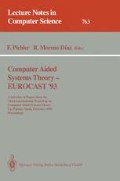Abstract
The paper proposes a problem transformation method for solving the minimum automaton identification problem. An algebraic characterization of a set of all simplest hypotheses explaining a given set of input-experiments is performed. It is shown that the minimum identification problem is polynomially transformable into a problem of determining a simplest congruence of the so-called basic hypothesis. It is proved that the method produces a weakly exclusive set of simplest hypotheses.
Preview
Unable to display preview. Download preview PDF.
References
Angluin D., Smith C.H., ”Inductive inference: Theory and Methods”. Computing Surveys, 15, pp. 237–269, 1983.
Angluin D., ”Learning regular sets from queries and counterexamples”. Information and Computation, 75, pp. 87–106, 1987.
Angluin D., ”On the complexity of minimum inference of regular sets”. Information and Control, 39, pp. 337–350, 1978.
Biermann A.W., ”Fundamental mechanisms in machine learning and inductive inference”. Lecture Notes in Computer Science, 322, pp. 133–171, 1985.
Gerardy R., ”New methods for the identification of finite state systems”. Intern. J. General Systems, 15, pp. 97–112, 1989.
Gill A., Introduction to the Theory of Finite-State Machines, McGraw-Hill, New York, 1962.
Gold E.M., ”Complexity of automaton identification from given data”. Information and Control, 37, pp. 302–320, 1978.
Kalman R.E., Falb P.I. and Arbib M.A., Topics in Mathematical System Theory, McGraw-Hill, New York, 1969
Kohavi Z., Switching and Finite Automata Theory, McGraw-Hill, New York, 1969.
Lunea P., Richetin M., Cayla C., ”Sequential learning of automata from input-ouput behaviour”. Robotica, 1, pp. 151–159, 1984.
Miclet L., ”Regular inference with a tail-clustering method”. IEEE Trans. Syst. Man. Cybern., 10, pp. 737–743, 1980.
Pichler F., Schwärtzel H., CAST: Methods in Modelling, Springer-Verlag, Berlin, 1992
Pao T.W., Carr III J.W., ”A solution of the syntactical induction-inference problem for regular languages”. Computer Languages, 3, pp. 53–64, 1978.
Reusch B., Merznich W., ”Minimal coverings for incompletely specified sequential machines”. Acta Informatica, 22, pp. 663–678, 1986.
Richetin M., Naranjo M., ” Inference of automata by dialectic learning”. Robotica, 3, pp. 159–163, 1985.
Rivest R.L., Schapire R.E., ”Inference of finite automata using homing sequences”. Proc. of ACM Symposium on Theory of Computing, Seattle, Washington, May, 1989, pp. 1–10.
Sierocki I., ”A description of a set of hypotheses for system identification problem”. Intern. J. General Systems, 15, pp. 301–319, 1989.
Sierocki I., ”A transformation of the problems of minimal satisfaction of constraints”. Lecture Notes in Computer Science, 585, pp. 218–224, 1992.
Sierocki I., ”A problem transformation and decomposition method for solving the minimum automaton identification problem”, submitted for publication
Veelenturf L.P.Y., ”Inference of sequential machines from sample computations”. IEEE Trans.Comput., 27, pp. 167–170, 1978.
Korf R.E., ”Macro-operators: A weak method of learning”, Artificial Intellignce, 26, pp.35–77, 1985.
Author information
Authors and Affiliations
Editor information
Rights and permissions
Copyright information
© 1994 Springer-Verlag Berlin Heidelberg
About this paper
Cite this paper
Sieiocki, I. (1994). An algebraic transformation of the minimum automaton identification problem. In: Pichler, F., Moreno Díaz, R. (eds) Computer Aided Systems Theory — EUROCAST '93. EUROCAST 1993. Lecture Notes in Computer Science, vol 763. Springer, Berlin, Heidelberg. https://doi.org/10.1007/3-540-57601-0_52
Download citation
DOI: https://doi.org/10.1007/3-540-57601-0_52
Published:
Publisher Name: Springer, Berlin, Heidelberg
Print ISBN: 978-3-540-57601-3
Online ISBN: 978-3-540-48286-4
eBook Packages: Springer Book Archive

